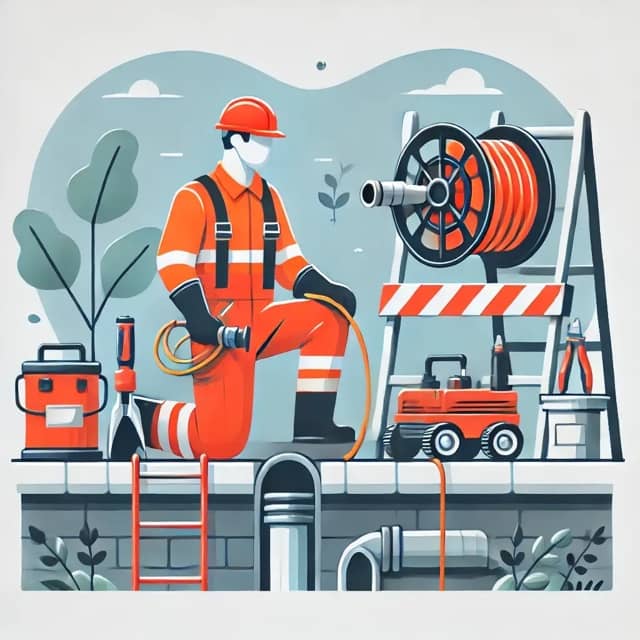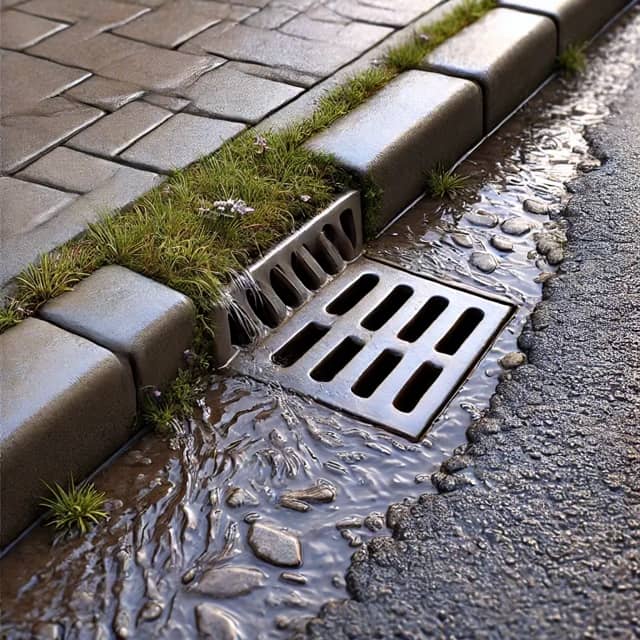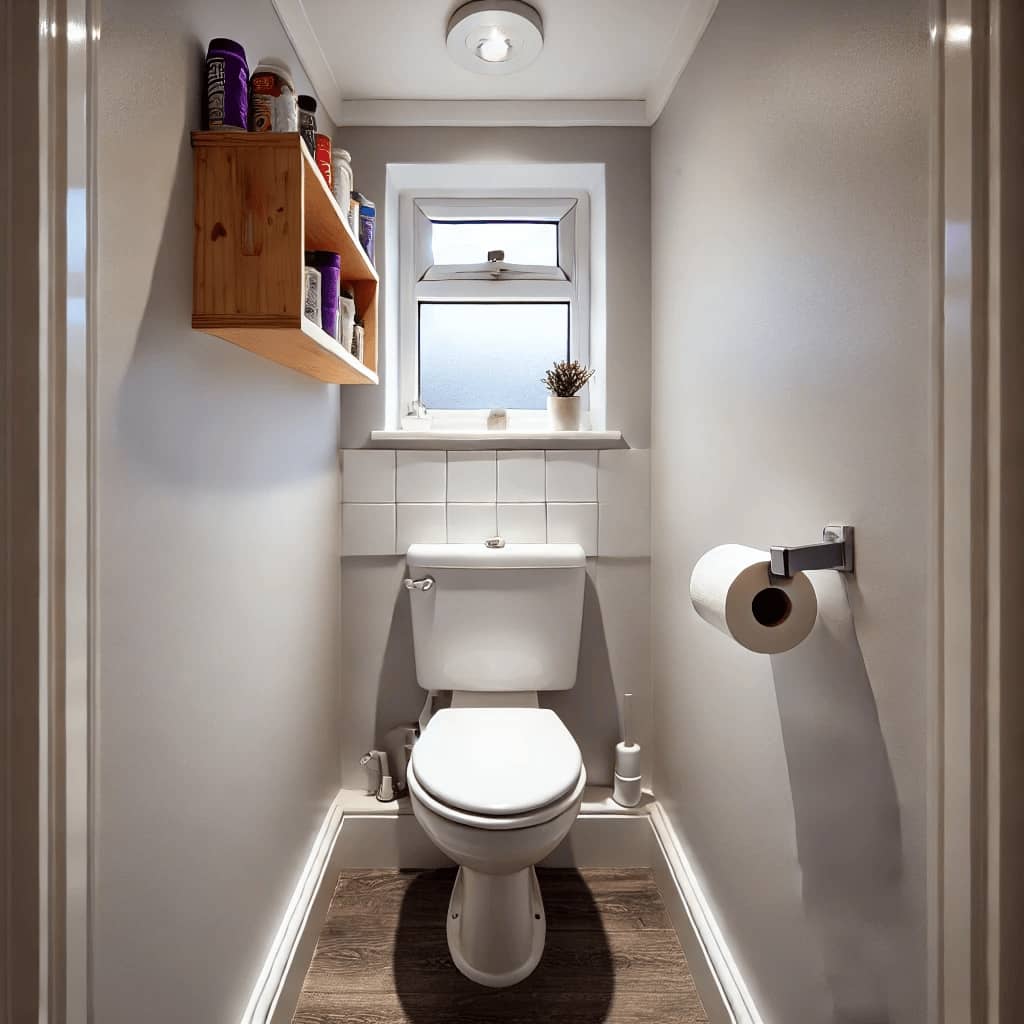What starts as a small nuisance can become a major headache with blocked drains. This is particularly the case during wet weather.
See our main drain unblocking page here for more details.
What Causes Blocked Drains in Boston Spa
Like other places, drainage systems in Boston Spa, like anywhere else, can suffer from a variety of blockages, often caused by everyday activities.
The main causes include:
Fat, Oil, and Grease Buildup
Fat, oil, and grease are common causes of blockages in kitchen drains. When poured down the sink, these substances solidify as they cool, eventually building up and restricting water flow.
Over time, this can lead to complete blockages, causing water to back up. This is a common problem for takeaways in Boston Spa.
Hair and Soap Scum
Bathroom drainage issues are often due to hair and soap residue clogging the drains.
As it accumulates, it prevents proper drainage, causing water to drain slowly or pool.
Non-Flushable Items
Items like wipes, sanitary products, or even small toys can easily become lodged in toilets or pipes.
These objects do not dissolve like toilet paper, resulting in large blockages.
Outdoor Debris and Roots
Outside drains in Boston Spa can be affected by tree roots seeking moisture from pipes, as well as leaves and debris during the autumn months.
Such issues can cause major blockages, particularly during heavy rain.
Indicators of Drain Blockages
If you notice any of the following problems, a drain unblocking service in Boston Spa may be necessary:
Gradual Water Drainage
Slow-draining sinks, baths, or showers often indicate a blockage.
Foul Odours
Odours from your drains can signal a blockage due to decomposing waste or trapped debris.
Strange Drain Noises
If you hear gurgling or bubbling sounds when water drains, this could be air trapped by a blockage, trying to escape through the system.
Water Backup or Drain Overflow
Standing water in sinks, baths, or external areas often signals a significant blockage.

Professional Drain Unblocking Services in Boston Spa
Professional assistance is the most effective approach for clearing blocked drains.
If you have checked with Boston Spa council and Leeds City Council and had no joy now might be a time to consider hiring a professional.
Using High-Pressure Jets
High-pressure jetting is one of the most powerful ways to clear drains. The process involves shooting water through pipes to clear away grease, roots, or debris.
This method is both thorough and environmentally friendly, as it doesn’t rely on chemicals.
Drain Snaking and Auger
When dealing with minor blockages, an auger or drain snake is often used.
This is a flexible, mechanical tool that can reach into pipes and physically break up clogs caused by hair, soap, or foreign objects.
CCTV Drain Surveys
When the blockage source is unclear, CCTV surveys help locate it.
The process uses a camera to detect blockages and examine pipe health.
Drain Repairs
Major blockages can result from broken or collapsed drainage. Fixing these issues keeps your drainage functioning for years.

Boston Spa: A Historic Village and the Importance of Drainage Maintenance
Boston Spa, a picturesque village in West Yorkshire, sits on the south bank of the River Wharfe, just 3 miles from Wetherby. Known for its Georgian architecture and vibrant community, this charming village combines historical elegance with modern living.
However, like many historic areas, Boston Spa faces unique challenges when it comes to infrastructure, particularly drainage.
Drainage Challenges in Boston Spa
Boston Spa’s mix of historic buildings and modern developments can lead to drainage issues.
Ageing drainage systems, tree root intrusion, and the village’s proximity to the River Wharfe make blocked drains a common concern.
Heavy rain can also overwhelm older systems, leading to flooding or waterlogging that can damage properties and disrupt daily life.
Signs of drainage problems in Boston Spa include slow-draining water, unpleasant smells, or water pooling around properties.
Addressing these issues promptly is essential to avoid long-term damage and maintain the village’s appeal.
How to Maintain Drains in Boston Spa
Proper maintenance and timely intervention can help prevent drainage problems. Here are some practical tips:
- Keep drains clear: Regularly remove debris like leaves, soil, or litter from outdoor drains.
- Avoid misuse: Don’t pour grease, oil, or unsuitable materials down sinks or toilets.
- Monitor your drains: Watch for early signs of blockages and act quickly to resolve them.
For major drainage issues, residents can contact Yorkshire Water (yorkshirewater.com), which manages public sewer systems in the area, or reach out to Leeds City Council for advice on local drainage responsibilities.
Why Drainage Matters for Boston Spa
Effective drainage isn’t just about convenience; it’s crucial for preserving Boston Spa’s historic charm and protecting its natural environment.
Properly managed drains prevent water damage to the village’s iconic Georgian buildings and help sustain its proximity to the River Wharfe.
Residents and businesses in Boston Spa should stay proactive about drainage maintenance to ensure the village remains a delightful place to live.
For further information on managing drainage or understanding local responsibilities, check resources like Leeds City Council or Yorkshire Water. Check here for the weather.

Who Is Responsible for Unblocking Your Drain in Boston Spa: Tenant, Landlord, or Local Council?
In Boston Spa, West Yorkshire, understanding who is responsible for unblocking drains can save time and ensure swift resolution of drainage problems.
Whether it’s the tenant, landlord, or local council, the responsibility typically depends on the location and cause of the blockage.
Tenant Responsibility
Tenants in Boston Spa are generally responsible for unblocking drains when the issue arises from misuse or day-to-day activities. Common causes include:
- Flushing inappropriate items such as wet wipes, sanitary products, or nappies.
- Pouring cooking grease or oils down the sink, which can harden and block pipes.
- Allowing hair and soap residue to clog bathroom drains.
Tenants should take steps to prevent blockages by using drain strainers, properly disposing of waste, and addressing minor clogs promptly.
Proactive care can avoid costly and inconvenient drainage problems.
Landlord Responsibility
Landlords are responsible for maintaining the structural integrity of drainage systems and addressing major issues, including:
- Collapsed or damaged pipes.
- Long-term blockages caused by tree roots or wear and tear.
- Ensuring the drainage system is in good working condition at the start of a tenancy.
If the blockage results from aging infrastructure or faulty installations, it is typically the landlord’s responsibility to arrange repairs.
Local Council Responsibility
For drainage issues beyond property boundaries, responsibility often falls to the local council or public utilities. In Boston Spa:
- Leeds City Council or the local authority handles public drains and sewers in roads or communal areas.
- Public sewer blockages should be reported to Yorkshire Water, which manages sewer systems in the region.
Councils and Yorkshire Water are responsible for maintaining and unblocking main sewers or public drainage systems affecting multiple properties.
How to Address Drainage Issues in Boston Spa
If you’re unsure who is responsible for a blockage, consider the following steps:
- Review your tenancy agreement: This document will clarify tenant and landlord responsibilities for drainage.
- Contact Yorkshire Water (yorkshirewater.com): They can confirm if a blockage is in a public sewer.
- Report public drainage issues to Leeds City Council: For blockages in communal or public areas.
Maintaining effective drainage in Boston Spa is essential for preserving the village’s charm and ensuring smooth day-to-day living.
By understanding drainage responsibilities and taking proactive measures, residents can keep their homes and community in excellent condition.

